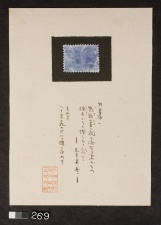Difference between revisions of "Tsuki kusa (Dayflower) - center (269 C)"
Jump to navigation
Jump to search
(username removed) |
(username removed) |
||
| Line 5: | Line 5: | ||
| 269 | | 269 | ||
|- | |- | ||
| − | ! scope="row"| | + | ! scope="row"|Uemura number / title |
| − | | | + | | ; "Haze-some 25" |
|- | |- | ||
! scope="row"|Folder location | ! scope="row"|Folder location | ||
| Line 41: | Line 41: | ||
| - | | - | ||
|- | |- | ||
| − | ! scope="row"| | + | ! scope="row"|Uemura's notes |
| − | | The plant was read in a Japanese classic poem in the | + | | The plant was read in a Japanese classic poem in the Manysh () , volume 7, from the 7th -8th century AD: |
|- | |- | ||
| − | ! scope="row"| | + | ! scope="row"|Uemura's date |
| Kyoto Murasakino | | Kyoto Murasakino | ||
|} | |} | ||
| − | [[Category: | + | [[Category:Uemura dye archive]] |
Revision as of 06:19, 24 July 2013
| Museum number | 269 |
|---|---|
| Uemura number / title | ; "Haze-some 25" |
| Folder location | 4th shelf |
| Sample location | center (269 C) |
| Fiber type | silk |
| Color | light blue stains |
| Dyestuff (Japanese common name) | つき草 : Tsuki kusa |
| Dyestuff (botanical name) | Commelina communis L. |
| Plant part | flower / fresh |
| Dyestuff extraction | flower juice was rubbed onto the fabric |
| Auxiliary agent in dye bath | - |
| Mordant | - |
| Other auxiliary agent | - |
| Uemura's notes | The plant was read in a Japanese classic poem in the Manysh () , volume 7, from the 7th -8th century AD: |
| Uemura's date | Kyoto Murasakino |
